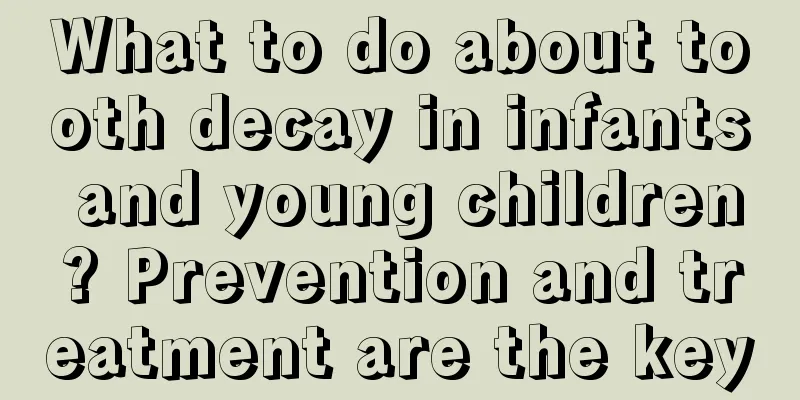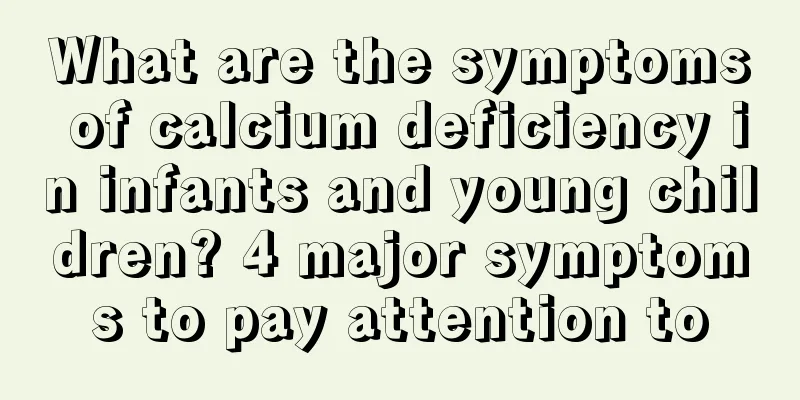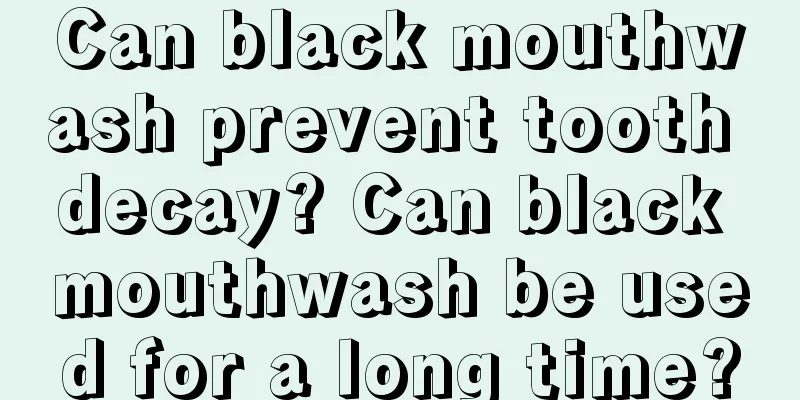What to do about tooth decay in infants and young children? Prevention and treatment are the key

|
Tooth decay is more common in infants and young children, which is mainly caused by some living habits. So what should we do when these problems occur? The following editor will introduce them to you one by one! How to prevent tooth decay in infants and young children1. Don’t share eating utensilsMany mothers like to share tableware with their children when feeding them. Exchanging saliva can easily cause tooth decay in infants and young children, so it is best to avoid this and let the baby use his own tableware. In addition, this can also train the child to eat by himself. 2. Wipe your baby's teethClean your baby's teeth every day. You can use gauze or cotton cloth with water to wipe your baby's teeth and gums. In addition to cleaning in the morning and evening, it is best to clean after every meal. 3. Don’t put sugar on the pacifierIf your baby has the habit of using a pacifier, never soak the pacifier or coat it with sugary substances, otherwise the baby will want to suck on it for a long time, which will make it more prone to tooth decay. 4. Clean your gumsNot only the teeth should be kept clean, but the gums should also be kept clean and massaged frequently. This will better protect the teeth and reduce tooth decay. 5. Don’t drink milk while sleepingMilk residue in the mouth can easily ferment and breed bacteria, causing tooth decay. Therefore, it is best not to let your baby drink milk when sleeping, whether it is from a bottle or a cup. Try to let your baby brush his teeth after drinking before going to bed. 6. Encourage the use of cupsWhen your baby is 1 year old, it is best to encourage him to drink milk from a cup instead of a bottle, because the milk will stay in the mouth longer when drinking from a bottle, which is more likely to cause tooth decay. 7. Avoid serving sweetsAvoid providing sweets or sticky foods to your children, as these can easily remain in the mouth, causing bacteria to grow and leading to tooth decay. 8. Use fluoride toothpasteWhen your baby is 3 years old, let him brush his teeth with a children's toothpaste containing fluoride. Fluoride cleans teeth better and can also protect enamel and reduce tooth decay. How to treat tooth decay in babies1. In the initial stageIf it is in the initial stage, then there is not much to worry about. When white spots appear on the upper front teeth, fluoride treatment is the first choice. Just apply a small amount of fluoride to the teeth, it can provide a new enamel surface and reduce tooth decay. 2. At a later stageIf there are already spots where the decay has occurred, fluoride treatment is not enough. Sometimes a treatment process similar to that for adult cavities may be needed, including the use of anesthesia and sedation to treat and restore the tooth, or even extraction. Cleaning baby's mouthHere are some methods and steps for parents to refer to: 1. Prepare a cup of warm water, a gauze towel or a few pieces of 4×4 cm gauze or a few cotton swabs or cotton sticks.2. Lay the baby flat on the bed in the bedroom, and the mother kneels in front of the baby, facing the baby.3. The mother supports herself on the bed with her elbows and can use her forearms to slightly block the baby's waving hands.4. The mother holds the infant's chin with her left wrist and palm, and uses her left index finger to slightly pull open the infant's cheek mucosa so that she can clearly see the entire oral condition of the infant.5. Wrap the index finger of your right hand with a gauze towel or gauze block and wet it with warm water, or hold a cotton swab or cotton stick in your right hand and dip it in warm water.6. Gently wipe the gums of the infant's mouth from the upper right to the upper left, and then from the upper left to the upper right.7. Gently wipe the cheek mucosa on both sides of the infant.8. Gently wipe the infant's palate mucosa and tongue surface.When cleaning the baby's mouth, you should pay attention to the following: Do not go too deep into the baby's mouth to reduce vomiting and discomfort. If the gauze or cotton swab is dirty, it should be replaced immediately to avoid bacterial infection. |
<<: What should I do if my newborn hiccups while sleeping?
Recommend
Will children who often drink soda lead to obesity? Does drinking soda really make you fat?
Young children like to drink soda, especially whe...
How to prevent heavy bleeding during childbirth
There will be various unexpected emergencies duri...
Can pregnant women eat silkworm pupae? What are the benefits of eating silkworm pupae for pregnant women?
Silkworm pupae are rich in nutrients, high in pro...
Can children with anemia eat donkey-hide gelatin? Can children with anemia get vaccinations?
It is normal for children to have anemia. Many ch...
What causes gestational diabetes? What are the symptoms of gestational diabetes?
Many pregnant women will develop diabetes during ...
How to eliminate the fear of prenatal pregnancy
The day of delivery is coming soon. Expectant mot...
What is the normal range of neonatal jaundice?
Many babies will get jaundice after birth, which ...
What is a doula delivery? How much does a doula delivery cost?
Childbirth is the most terrifying and difficult s...
What should I do if my baby walks on tiptoes? How to tell if it is normal?
Some babies like to walk on tiptoes, which makes ...
Secondhand smoke is more toxic than PM2.5, and young children suffer from asthma and decreased intelligence
Don’t think that smoking outside will not harm yo...
Can I eat cauliflower during breastfeeding? Will eating cauliflower during breastfeeding have any effect on the baby?
We often say that mother's food is baby's...
Can balance ball exercise help you lose weight? It is the most suitable for postpartum weight loss.
The body shape cannot be restored after childbirt...
Why do babies cry all the time when they sleep at night? What are the reasons for babies crying at night?
Have you ever encountered a situation where babie...
How to make your baby not afraid of injections
Babies are born with weak immunity and need some ...
What should I do if my baby doesn't get along with others in kindergarten and always plays alone?
Babies will be happy when they play with other ch...









